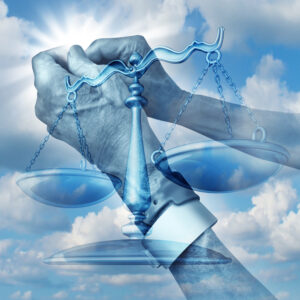In a new article published in the World Association for Psychosocial Rehabilitation Bulletin, Peter McGovern and his colleagues explore the continued human rights violations of people with a psychosocial disability in mental healthcare systems. They draw particular attention to how practitioners and policymakers can implement existing frameworks to mitigate these violations.
The authors argue that a recovery-centered approach utilizing the World Health Organization’s QualityRights initiative can create mental healthcare systems that uphold fundamental human rights as outlined in the United Nations Convention on the Rights of People with Disabilities (CRPD). They write:
“This shift to a new model of understanding places the person and citizen in the center of all decisions about their lives. Furthermore, it empowers the citizen as a person with a right to be included in their community. Mental health services are viewed as an important tool, among many others, in the armory of a person navigating the complexities of a mental health condition or psychosocial disability, as well as an opportunity to recover citizenship. It is for the person to decide which tools are helpful for their recovery journey and when they should be deployed.”
 The CRPD was ratified at the U.N. in 2006 and since has been adopted by many nations. The central goal of the CRPD is to protect people with disabilities from discrimination and ensure they enjoy all the freedoms of their non-disabled counterparts. To this end, the CRPD declares that all people with disabilities, including mental health issues, should be allowed to make their own treatment choices and should not be involuntarily confined. This would require a radical reevaluation of mental healthcare systems in many countries and a move away from a medical model towards a social one.
The CRPD was ratified at the U.N. in 2006 and since has been adopted by many nations. The central goal of the CRPD is to protect people with disabilities from discrimination and ensure they enjoy all the freedoms of their non-disabled counterparts. To this end, the CRPD declares that all people with disabilities, including mental health issues, should be allowed to make their own treatment choices and should not be involuntarily confined. This would require a radical reevaluation of mental healthcare systems in many countries and a move away from a medical model towards a social one.
People with mental health diagnoses experience increased instances of prejudice and discrimination, both in their communities and through systematic denial of rights, including but not limited to involuntary confinement and treatment. For example, in the United States, all but ten states still systematically exclude people with psychosocial disabilities from exercising their right to vote.
Stigma and discrimination have been linked to the biomedical model of mental health. Conversely, psychosocial explanations, like those championed by recovery-oriented treatment, have reduced stigma. Research has found that while mental health literacy does not reduce stigma, psychosocial approaches do. Research has also shown that stigma is more associated with labeling than behavior. For example, if a person repeatedly looks out their window and we label that person “strange,” they will experience less stigma than if we label them “paranoid.”
The public appetite for coercive, human rights violating treatments for people with psychosocial disabilities is linked to both stigmas around mental illness and lack of education. Recovery-oriented services, like the ones championed by the current work, lead to less stigma around mental illness while simultaneously benefiting providers.
The current work begins by laying out the landscape of mental healthcare in Norway. While they have adopted many progressive policies, such as an increase in community-oriented approaches and strengthening user involvement, they retain an allegiance to the problematic biomedical model of mental health and continue the emphasis on hyper-individualization that can often ignore systematic problems. Moreover, while Norway ratified the CRPD in 2013, it has yet to incorporate its principles into law due mainly to the requirement in Norway to coerce people with psychosocial disabilities into various forms of treatment, including involuntary confinement.
In place of the overemphasis on biomedical, highly individualized explanations and the human rights violating treatments of the current paradigm in mental health, the authors offer a recovery perspective informed by the World Health Organization’s QualityRights initiative. This kind of treatment emphasizes six different aspects of recovery:
- Connectedness: Relationships are central to recovery, and everyone in a community should have access to the same recovery resources as everyone else.
- Hope: People must be able to see their situation improving in the future in order for recovery to be possible.
- Identity: This approach emphasizes the freedom to reconnect, rebuild, and redefine identity without “internalized oppression and self-stigma.”
- Meaning in life: Supporting the building (or rebuilding) of meaning in various ways
- Empowerment: Giving people control and choice over their recovery and treatment
- Risk: Making room for people to take risks and make mistakes
For the authors, these aspects of the recovery model are linked to the concept of “citizenship” in mental healthcare; the rights, responsibilities, roles, resources, and relationships of a functioning member of society. As a marginalized group, there are two basic pathways to “citizenship” for those with psychosocial disabilities. First is the individual effort to access full citizenship. Second is the responsibility of society to open access to “citizenship.” In this model, responsibility for “citizenship” lies both with individual efforts and societal scaffolding.
The World Health Organization’s QualityRights initiative was designed to improve mental healthcare quality and promote the rights of people with psychosocial disabilities. To this end, the QualityRights initiative revolves around four basic principles: addressing stigma and human rights violations, supporting countries in developing sensible mental health policies, including service user experiences in mental health discussions and debates, and supporting law reform to bring countries more in line with the CRPD. The authors believe this approach can help the public view people with psychosocial disabilities as full citizens and change attitudes towards mental illness while empowering everyone involved in mental health systems to promote human rights. The authors ultimately believe that the key to empowering individual recovery is to correct systematic barriers to full civic participation.
The framework described by the authors calls for a paradigm of support rather than prescription. Recovery is not a one-size-fits-all arrangement but an intricate tapestry of overlapping areas of influence. By recognizing the basic right of each individual to walk their own path of recovery and emphasizing support in that journey, the authors believe this framework could vastly improve the lives of many people across the world while mitigating the abuses and human rights violations that commonly occur in the current mental health system in many nations. They conclude:
“It is imperative that we move away from societies and services that coerce people into complying with treatments or interventions they do not find helpful. Particularly when they may recreate the trauma of violence or control that many of our service users have already been victims of. Freedom, the right to make your own decisions, and taking back control of one’s own narrative is therapeutic and should be the cornerstone of all modern and progressive mental health services.”
****
McGovern P, Ellingsdalen M, Borg M. (2022). Reclaiming citizenship through rights-based, person-centered, and recovery-oriented mental health services. WAPR BULLETIN. 48 (Link)















Citizens with psychiatric diagnoses can’t vote in many states in the USA? That’s the first I’ve heard of that one. How is this enforced, exactly?
Report comment
Professor Sears: Do Peter McGovern and colleagues err in suggesting that one born into a country with citizenship actually recover something that by right, is neither lost. For to understand a lanuage that empowers and affords LIFE in the unconscious becoming conscious domain requires expressions of inquiry? When one’s civil rights are being violated against one’s will that may be confined to or in a mental hospital, then where are the skills to know when trauma is being created (assuming the human, the citizen being global through e-networks is attempting to realize change)? Where is the consciousness within the legal profession or the domain of therapeutic jurisprudence if part of the skill is tied to how the issue(s) are being framed for the courts?
Report comment
I am not sure about that not voting thing either for those who allegedly have “psychiatric disabilities.” It may be a factor if one is hospitalized or confined to an institution either voluntarily or involuntarily. Of course, incarceration in prison, in most states will be an immediate denial of the voting franchise. If in a hospital and “sick” for any reason, there may not be motivation to vote or one could be too incapacitated to vote. The same could be said for someone in an assisted living facility. On the whole, I have never been asked either voting absentee or in person if I had any kind of “diagnosis” for anything that would prevent me from performing my civic duty. I guess, in some states, this could be used to prevent someone from voting whom you might not want to vote for some reason, probably nefrious. But, it would cause such an outcry or whatever, I doubt if it’s used. Believe it or not, one can usually walk around with an alleged “psychiatric disability” or whatever and no one will know or care, unless that person exhibits strange or seemingly dangerous behavior. Thank you.
Report comment
Before I depart from doing comments on MIA, and I really must leave, I found a copy of a comment I made once or wished to but held back from doing so. Here it is….
Dear Activist, what makes you think your way of saving the world is the “only” way? Such that there are no other ways? Or a beautiful combination of ways?
And what makes you think your concept of “the world” bears any relation to another person’s experience of “their world”?
And what makes you think the world needs “saving” anyway? What do you mean by “saving”? Does the sparrow save the sun? Does the minnow save the river?
It can feel thrilling to be trying to “save”. And as an added understandable perk of that job, it grants a sense of importance to the saviour who perhaps ordinarily feels like a nobody. Activism can be a saviour antidepressant to those who buy the notion they are nobody if they are not needed. The modern decline in communities and tribes leaves a vast multitude feeling they are not needed. And combining this sense of rejection with bullying coming at them through the world, there seems an urgent need for an uprising against such intolerable hurts. But one person’s saviour is another person’s bully. As more and more saviour activists tumble centre stage, more and more people feel bullied by them, enough to become saviour activists who go on to bully. Until the world is drowning in persecution.
Everyone has a completely different notion of “the world”. Their own way of fixing it will be guided by their “free choices”, just as your way of mending “the world” will be based on your “free choices”. Provided that you are not a bully, nor cruel, nor determined to impose “your way” or “your activism” or “your knowledge” on unwilling receivers, there is no direct harm caused by you enjoying your “free choices”. And when you liberate yourself to love all your “free choices”, free from condemnation, nitpicking, criticism, you become happy. The happy feel no need to save “the world”, because they have made themselves “the world”, a world of love. And when everyone feels that degree of inner wellbeing the world truly does become a heaven on Earth.
But bleeding ears don’t hear. As Vincent Van Gogh discovered. Those in pain cannot hear love. There is no getting through any message of healing until the ears of eight billion have been sponged clean of other peoples horrible choices made “for them”, inflicted upon them through surreptitious coaxing, schooling, mantra-reciting bullying.
On the internet are millions of mosaics of videos of peoples fleshy, haggard, exhausted faces, hurriedly rattling off reels of rhetoric for activism. Most of the voices are tirades. Most of the faces hate you. And those that cherish you only do so because you can add your hate to their hate and build a thousand “likes” of hatred. And all the emerging generations can see how hateful the world is getting, since a million activists say it is so, pointing to different activists who say other activists are to blame.
Dear Activist, the real world, of lush grass and family singsongs and sparrows and minnows and rivers and the steady glowing moon disc is not hateful. It is teeming with abundant love. And one way to actually save it, if that is your “free choice”, is to realize it does not need saving by your hatred. Activism won’t save it, pacifism will. On a globe bristling with nuclear warheads it is not activism the world needs but, after a millennia, for humans to finally, finally, finally “be” as the animals “be”….and
“Do nothing global”.
No butterfly flaps its wings over the whole globe. But by doing so locally instead, it affects everything…eventually.
Report comment